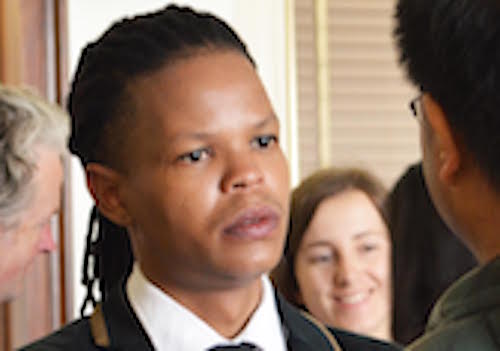
Human rights defender's story: Jacobus Witbooi from Namibia
Jacobus Witbooi from Namibia champions LGBTIQ rights and sexual health education, impacting national policies and fostering support for sexual orientation and gender identity rights in Africa.
Jacobus Witbooi knows himself to be an ‘innate activist’ and says that his passion for human rights ‘comes from the inside.’ It has always been a strong part of who he is, taking up the challenge to advocate for those without a voice at a very early age. When still attending school, he recalls campaigning for education on safe sex and sexual health information and advice before it was even considered by national school policy makers.
‘Everyone knew that there were young people having unprotected sex, but they also didn’t have access to condoms, let alone information or advice from community health services about sexual health and safety, especially if they contracted a STI…They felt judged, couldn’t take steps to protect themselves or get help they needed.’
As he matured as a young professional he continued to pursue the issue and played a key role in eventually getting sex education on the national school curriculum in Namibia. He also helped to create a platform for young people to have a say in the design and evaluation of sexual and reproductive health programs, as well as assist health services to provide a caring and sympathetic environment for young people, enhancing accessibility.
Creating a network to drive change
Jacobus’ human rights advocacy journey has brought him to Pan Africa ILGA, a recently formed and rapidly expanding membership-based network for activists working to advance sexual orientation and gender identity rights. He delivers a continent-wide outreach strategy to small, grassroots LGBTI activists and defenders, helping to develop their skills and confidence to engage with both the UN human rights mechanisms and the African Commission on Human and Peoples’ Rights (the African Commission), and grow their ability to achieve meaningful and lasting human rights change.
The issue is close to his heart. He remembers coming out at a time in Namibia when it was unsafe, denied and denounced by all corners of the community.
‘I didn’t feel welcome in my own country, and was told I should leave.’
Whilst Pan Africa ILGA is rapidly expanding – it now has over 100 members – Jacobus is aware of the limitations his service can provide, and the needs of local LGBTI community organisations.
‘There’s a gap between the amount of work we can do to support local human rights activists, and how far we can teach them to carry forward UN outcomes and recommendations into their country.’
But he adds that he refuses to accept that it is a gap that cannot be closed. In May, Jacobus had a key part in delivering the third PAI regional LGBTI conference in South Africa. Bringing together 184 African delegates from over 34 African States, coming together to convene and share strategies, visions and fostering opportunities to collaborate. More encouraging, was the attendance of Government representatives and members of the African Commission, as well as National Human Rights Institutions.
Highlighting this significant social and political development, Jacobus points out that there is a growing support for sexual orientation and gender identity rights on the African continent, and is optimistic for the future of the LGBTI community. However, he knows there is a lot more work to be done.
‘I think this space we created was critical as a continent – sharing the success stories. But, how do we move this forward, and deal with the intersectionality of sexual orientation and gender identity issues?’
Expanding his human rights advocacy potential
He identified that one way forward for him was to better harness the UN international human rights mechanisms and expand his human rights advocacy potential and successfully applied to participate in the ISHR Human Rights Advocacy Programme.
‘It’s helped me a lot. I’ve broadened my understanding of available UN-mechanisms beyond the Universal Periodic Review alone. I’ve learnt that there is a wide range of approaches to doing human rights advocacy through the UN. This awareness combined with the confidence I’ve now gained will be vital for me on the ground back home.’
He has also noticed his own approach to engaging in human rights advocacy has transformed.
‘I’ve become more strategic now. Because I have a deeper understanding of the UN system, it means that I can use multiple mechanisms to get outcomes, such as the Treaty Bodies and the Special Procedures.’
Contributing to the first UN Resolution on Sexual Orientation and Gender Identity
With his training coinciding with the 32nd session of the Human Rights Council, Jacobus became heavily involved in contributing to the Working Group advocating and lobbying for a strong resolution on sexual orientation and gender identity. He describes this as,
‘My first real hands on experience advocacy at the Council, working with states delegations and diplomats, trying to bring across an argument that is sensitive and difficult to move on, and coming from a region where it is very difficult to even talk about. It has given me a better understanding of how these things work, what components come into play when these decisions are made.’
Contact: [email protected]
Follow him on Twitter @jacobuswitbooi
